Niggli, Urs; Sonnevelt, Martijn; Kummer, Susanne: Pathways to advance agroecology for a successful transformation to sustainable food systems : Food Systems Summit Brief Prepared by Research Partners of the Scientific Group for the Food Systems Summit June 2021.
Online-Ausgabe in bonndoc: https://doi.org/10.48565/scfss2021-wf70
Online-Ausgabe in bonndoc: https://doi.org/10.48565/scfss2021-wf70
@article{handle:20.500.11811/9163.2,
doi: https://doi.org/10.48565/scfss2021-wf70 ,
author = {{Urs Niggli} and {Martijn Sonnevelt} and {Susanne Kummer}},
title = {Pathways to advance agroecology for a successful transformation to sustainable food systems : Food Systems Summit Brief Prepared by Research Partners of the Scientific Group for the Food Systems Summit June 2021},
publisher = {Center for Development Research (ZEF) in cooperation with the Scientific Group for the UN Food System Summit 2021},
year = 2021,
month = jun,
note = {Agroecology is a powerful strategy that reduces the trade-offs between productivity and sustainability. It promotes the diversity of crops and livestock, fields, farms and landscapes that together are key to improve sustainability of food and farming systems in terms of long-term productivity, food actors' empowerment and inclusion and environmental health. Agroecology is a bundle of measures taken by farmers, which individually or combined, mobilize biodiversity and ecosystem services for productivity. Ideally, it leads to economically and ecologically resilient production systems that are high-yielding. It is not necessarily a predefined farming system and the shift from simplified by industrial standards to agroecological farms is gradual. The transformation and upscaling of agroecological practices require changes that affect not only the management of farms, or production and consumption patterns at the food system level, but also the institutional framework conditions and the way we measure the performance of agricultural and food systems. In our paper, we describe four domains of transformation - knowledge systems, markets, collaborations and policy coherence - each with enabling and constraining factors.},
url = {https://hdl.handle.net/20.500.11811/9163.2}
}
doi: https://doi.org/
author = {{Urs Niggli} and {Martijn Sonnevelt} and {Susanne Kummer}},
title = {Pathways to advance agroecology for a successful transformation to sustainable food systems : Food Systems Summit Brief Prepared by Research Partners of the Scientific Group for the Food Systems Summit June 2021},
publisher = {Center for Development Research (ZEF) in cooperation with the Scientific Group for the UN Food System Summit 2021},
year = 2021,
month = jun,
note = {Agroecology is a powerful strategy that reduces the trade-offs between productivity and sustainability. It promotes the diversity of crops and livestock, fields, farms and landscapes that together are key to improve sustainability of food and farming systems in terms of long-term productivity, food actors' empowerment and inclusion and environmental health. Agroecology is a bundle of measures taken by farmers, which individually or combined, mobilize biodiversity and ecosystem services for productivity. Ideally, it leads to economically and ecologically resilient production systems that are high-yielding. It is not necessarily a predefined farming system and the shift from simplified by industrial standards to agroecological farms is gradual. The transformation and upscaling of agroecological practices require changes that affect not only the management of farms, or production and consumption patterns at the food system level, but also the institutional framework conditions and the way we measure the performance of agricultural and food systems. In our paper, we describe four domains of transformation - knowledge systems, markets, collaborations and policy coherence - each with enabling and constraining factors.},
url = {https://hdl.handle.net/20.500.11811/9163.2}
}






